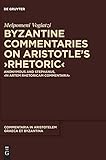Byzantine Commentaries on Aristotle's ›Rhetoric‹ : Anonymous and Stephanus, ›In Artem Rhetoricam Commentaria‹ / Melpomeni Vogiatzi.
Material type: TextSeries: Commentaria in Aristotelem Graeca et Byzantina ; 8Publisher: Berlin ; Boston : De Gruyter, [2019]Copyright date: ©2019Description: 1 online resource (VI, 268 p.)Content type:
TextSeries: Commentaria in Aristotelem Graeca et Byzantina ; 8Publisher: Berlin ; Boston : De Gruyter, [2019]Copyright date: ©2019Description: 1 online resource (VI, 268 p.)Content type: - 9783110626759
- 9783110628630
- 9783110630695
- 808.5 23
- PA3893.R4 V64 2019
- online - DeGruyter
- Issued also in print.
| Item type | Current library | Call number | URL | Status | Notes | Barcode | |
|---|---|---|---|---|---|---|---|
 eBook
eBook
|
Biblioteca "Angelicum" Pont. Univ. S.Tommaso d'Aquino Nuvola online | online - DeGruyter (Browse shelf(Opens below)) | Online access | Not for loan (Accesso limitato) | Accesso per gli utenti autorizzati / Access for authorized users | (dgr)9783110630695 |
Browsing Biblioteca "Angelicum" Pont. Univ. S.Tommaso d'Aquino shelves, Shelving location: Nuvola online Close shelf browser (Hides shelf browser)

|

|

|

|

|

|

|
||
| online - DeGruyter Business Negotiations in ELF from a Cultural Linguistic Perspective / | online - DeGruyter Studien zur Wirtschafts-, Sozial- und Rezeptionsgeschichte der Antike / | online - DeGruyter Die Verfassung von Cádiz (1812) : Spaniens Sprung in die Moderne, gespiegelt an der Verfassung Kurhessens von 1831 / | online - DeGruyter Byzantine Commentaries on Aristotle's ›Rhetoric‹ : Anonymous and Stephanus, ›In Artem Rhetoricam Commentaria‹ / | online - DeGruyter Internationales Wirtschaftsrecht / | online - DeGruyter Literatur und Musik im Künstevergleich : Empirische und hermeneutische Methoden / | online - DeGruyter Prudentius, ›Psychomachia‹ : Einleitung, Text, Übersetzung und Kommentar / |
Frontmatter -- Contents -- 1. Introduction -- 2. Rhetorical Arguments in the Commentaries to the Rhetoric -- 3. Topoi of Fallacious Arguments in the Commentaries on Rhetoric II.24 -- 4. Ethical Definitions in the Commentaries to the Rhetoric -- 5. Emotions in the Commentaries to the Rhetoric -- 6. The Account of Style in the Commentaries on Rhetoric III -- 7. Conclusions -- Bibliography -- Index
restricted access online access with authorization star
http://purl.org/coar/access_right/c_16ec
Anonymous’ and Stephanus’ commentaries, written in the 12th century AD, are the first surviving commentaries on Aristotle’s Rhetoric. Their study, including the environment in which they were written and the philosophical ideas expressed in them, provides a better understanding of the reception of Aristotle’s Rhetoric in Byzantium, the Byzantine practice of commenting on classical texts, and what can be called “Byzantine philosophy”. For the first time, this book explores the context of production of the commentaries, discusses the identity and features of their authors, and reveals their philosophical and philological significance. In particular, I examine the main topics discussed by Aristotle in the Rhetoric as contributing to persuasion, namely valid and fallacious rhetorical arguments, ethical notions, emotional response and style, and I analyse the commentators’ interpretations of these topics. In this analysis, I focus on highlighting the value of the philosophical views expressed, and on creating a discussion between the Byzantine and the modern interpretations of the treatise. Conclusively, the two commentators need to be considered as independent thinkers, who aimed primarily at integrating the treatise within the Aristotelian philosophical system.
Issued also in print.
Mode of access: Internet via World Wide Web.
In English.
Description based on online resource; title from PDF title page (publisher's Web site, viewed 28. Feb 2023)


